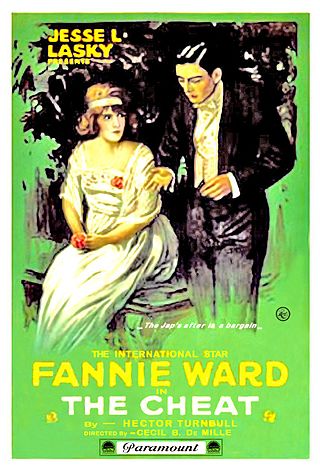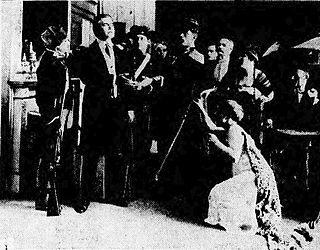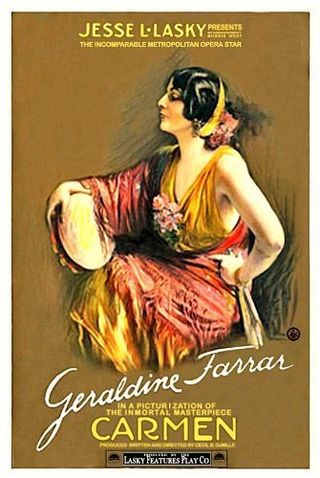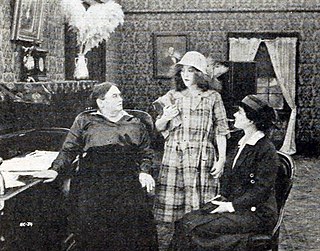
The Cheat is a 1915 American silent drama film directed by Cecil B. DeMille, starring Fannie Ward, Sessue Hayakawa, and Jack Dean, Ward's real-life husband.

The Volga Boatman is a 1926 American silent drama film directed by Cecil B. DeMille, who reportedly said the film was, "his greatest achievement in picture making". The film's budget was $479,000 and it grossed $1.27 million. The film was highly successful, turning William Boyd into matinee idol overnight.

Abbie Jean MacPherson was an American silent actress, writer and director. She is known for her collaborations with directors D. W. Griffith and Cecil B. DeMille, and was a founding member of the Academy of Motion Picture Arts and Sciences.

The Virginian is a 1914 American silent Western film based on the 1902 novel The Virginian by Owen Wister. The film was adapted from the successful 1903–04 theatre play The Virginian, on which Wister had collaborated with playwright Kirke La Shelle. The Virginian starred Dustin Farnum in the title role, a role he reprised from the original play. It was directed by Cecil B. DeMille.

The Man from Home is a 1914 American drama film based on a play written by Booth Tarkington and Harry Leon Wilson. It was directed by Cecil B. DeMille. In 1922, the story was remade in the UK by George Fitzmaurice as The Man From Home, and released by Famous Players–Lasky. The stage play was a big hit for actor William Hodge in the role of Pike in the 1908 Broadway season.

The Captive is an American silent-era film released on April 22, 1915. It was released on five reels. The film was written, directed, edited, and produced by Cecil B. DeMille. Jesse L. Lasky was another producer and Jeanie MacPherson worked with DeMille to write the screenplay. The film is based on a play written by Cecil B. DeMille and Jeanie MacPherson. The Captive grossed over $56,000 on a budget of $12,154. Blanche Sweet stars as Sonia Martinovich, alongside House Peters who stars as Mahmud Hassan. The film details the romantic war-era plight of Sonia and her lover Mahmud.

Kindling is a 1915 American drama film produced and directed by Cecil B. DeMille and starring Charlotte Walker, in her film debut. The film is based on a 1911 Broadway play by Charles A. Kenyon which starred Margaret Illington and was produced by her husband Major Bowes, later of radio fame.

Carmen is a 1915 American silent drama film directed by Cecil B. DeMille. The film is based on the novella Carmen by Prosper Mérimée. The existing versions of this film appear to be from the re-edited 1918 re-release.

Temptation is a 1915 American silent romantic drama film directed and produced by Cecil B. DeMille. The film starred Geraldine Farrar and Theodore Roberts and was written by and based on an original story by Hector Turnbull. Additional writing was done by DeMille and Jeanie MacPherson, who did not receive screen credit.

The Dream Girl was a 1916 American silent drama film directed by Cecil B. DeMille. Based on an original story by DeMille writer Jeanie MacPherson, the film starred Mae Murray and Theodore Roberts.

The Devil-Stone is a 1917 American silent romance film directed by Cecil B. DeMille, co-written by his mother Beatrice deMille and Jeanie MacPherson, and starring Geraldine Farrar.

Don't Change Your Husband is a 1919 American silent comedy film directed by Cecil B. DeMille and starring Gloria Swanson. The film was the third of six "marriage films" directed by DeMille and the first DeMille film starring Gloria Swanson. A Chinese silent film, Don't Change Your Husband (1929), used the same English title, and a similar plot arc.

For Better, for Worse is a 1919 American silent drama film directed by Cecil B. DeMille and starring Gloria Swanson. The film was the second of four "marriage films" directed by DeMille and the second DeMille film starring Gloria Swanson. For Better, for Worse was adapted for the screen by William C. DeMille. Jeanie MacPherson wrote the film's scenario.

Saturday Night is a 1922 American silent romantic comedy film directed by Cecil B. DeMille and starring Leatrice Joy, Conrad Nagel, and Edith Roberts. It was Leatrice Joy's first film with DeMille.

Adam's Rib is a 1923 American silent drama film directed by Cecil B. DeMille. It was written by Jeanie MacPherson. For the dinosaurs represented in the film, Ray S. Bassler acted as technical advisor. The filmed premiered at New York's Rivoli Theatre on February 25, 1923.

Triumph is a 1924 American silent drama film directed by Cecil B. DeMille and starring Leatrice Joy and Rod La Rocque. It was based on a 1924 novel of the same name by May Edginton. The novel had previously been serialized in 1923 by The Saturday Evening Post.
Feet of Clay is a 1924 American silent drama film directed and produced by Cecil B. DeMille, starring Vera Reynolds and Rod La Rocque, and with set design by Norman Bel Geddes. The film is based on the 1923 novel by Margaretta Tuttle, and Beulah Marie Dix's one-act 1915 play Across the Border.

The Road to Yesterday is a 1925 American silent romantic drama film directed by Cecil B. DeMille. The film was based on a 1908 play of the same name by Beulah Marie Dix and Evelyn Greenleaf Sutherland and was adapted by Dix and Jeanie MacPherson. Art direction for the film was done by Paul Iribe, Anton Grot, Mitchell Leisen, and Max Parker.

Young April is a 1926 American silent romantic comedy film directed by Donald Crisp, and starring Bessie Love, Joseph Schildkraut, and Rudolph Schildkraut. The film was produced by Cecil B. DeMille's production company and distributed by Producers Distributing Corporation. The film was adapted from Egerton Castle's 1899 novel of the same name by Jeanie MacPherson and Douglas Z. Doty. Art direction for the film was done by Anton Grot and its costumes were designed by Adrian.

Rose of the Rancho is a 1936 American action film directed by Marion Gering and written by Frank Partos, Charles Brackett, Nat Perrin and Arthur Sheekman, adapted from the play of the same name by David Belasco and Richard Walton Tully. The film stars John Boles, Gladys Swarthout, Charles Bickford, Grace Bradley, Willie Howard and Herb Williams. It was released on January 10, 1936, by Paramount Pictures.



















